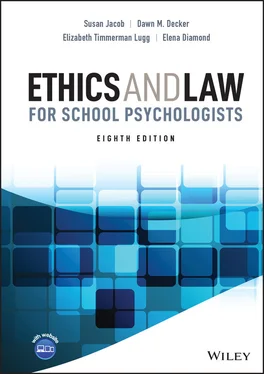Susan Jacob - Ethics and Law for School Psychologists
Здесь есть возможность читать онлайн «Susan Jacob - Ethics and Law for School Psychologists» — ознакомительный отрывок электронной книги совершенно бесплатно, а после прочтения отрывка купить полную версию. В некоторых случаях можно слушать аудио, скачать через торрент в формате fb2 и присутствует краткое содержание. Жанр: unrecognised, на английском языке. Описание произведения, (предисловие) а так же отзывы посетителей доступны на портале библиотеки ЛибКат.
- Название:Ethics and Law for School Psychologists
- Автор:
- Жанр:
- Год:неизвестен
- ISBN:нет данных
- Рейтинг книги:3 / 5. Голосов: 1
-
Избранное:Добавить в избранное
- Отзывы:
-
Ваша оценка:
- 60
- 1
- 2
- 3
- 4
- 5
Ethics and Law for School Psychologists: краткое содержание, описание и аннотация
Предлагаем к чтению аннотацию, описание, краткое содержание или предисловие (зависит от того, что написал сам автор книги «Ethics and Law for School Psychologists»). Если вы не нашли необходимую информацию о книге — напишите в комментариях, мы постараемся отыскать её.
Ethics and Law for School Psychologists
Ethics and Law for School Psychologists
Ethics and Law for School Psychologists — читать онлайн ознакомительный отрывок
Ниже представлен текст книги, разбитый по страницам. Система сохранения места последней прочитанной страницы, позволяет с удобством читать онлайн бесплатно книгу «Ethics and Law for School Psychologists», без необходимости каждый раз заново искать на чём Вы остановились. Поставьте закладку, и сможете в любой момент перейти на страницу, на которой закончили чтение.
Интервал:
Закладка:
In the United States, the federal court system has three tiers or layers; most state court systems also have three tiers or layers. As H. R. Turnbull and Turnbull (2000, p. 6) observed, “Why a case may be tried in one court, appealed or reviewed by another, and finally disposed of by yet another is a matter of great complexity.” A brief discussion of the state and federal court systems follows.
State court systems vary in organization and complexity. Cases filed in the lowest court may be appealed to an intermediate-level court, if a state has one. Decisions then may be appealed to the supreme court of the state, the “court of last resort” (Russo, 2018). The U.S. Supreme Court may review cases from a state court if a question of federal law is involved. Within the federal system, at the lowest level are the trial courts, called district courts. Nearly 100 federal district courts exist. At the intermediate level are 11 numbered federal circuits or geographical areas and the District of Columbia. Each court at this level is called a circuit court of appeals. These courts hear appeals from the district courts. They decide issues of law, not fact. The highest court in the federal system is the U.S. Supreme Court. A person who loses a case in a federal court of appeals or the highest state court may submit a written petition requesting the Supreme Court to review the case. The Supreme Court agrees to review a case by granting a writ of certiorari (an order calling up a case from a lower court for review). However, the Supreme Court selects only those cases it considers most important to review, and consequently, only a small percentage of the requests for review are granted.
The federal court system decides both civil and criminal cases. Criminal cases involve crimes prosecuted by the government, not private citizens (e.g., murder, theft, and assault). Civil cases are lawsuits brought by private parties. Federal courts rule only on cases that involve federal constitutional or statutory law or cases that involve parties from two different states. The U.S. Supreme Court has the final authority in interpreting the U.S. Constitution and federal statutes. State courts also decide both civil and criminal cases. State courts rule on cases involving state and statutory law, but also may rule on cases involving the federal Constitution and statutory laws.
The role of the courts is to resolve disputes involving citizens, organizations, and the government. Courts also decide the guilt or innocence of those accused of crimes. In education, most disputes are decided in civil court. Courts decide conflicts by applying law to a given set of facts and interpreting the meaning of the law in that context. It is the function of courts to say what the Constitution or statute means in a given case, set forth the findings of fact that the interpretation is based on, and enter an order commanding the parties in the case to take certain action (or, if the case is on appeal, the judge may enter an order for another court to take action). If there is no codified law (no constitutional or statutory provision) found controlling in a case, the court is likely to rely on common law (legal precedents) in rendering a decision (Hubsch, 1989; H. R. Turnbull & Turnbull, 2000). In reading about court rulings, remember that decisions of the U.S. Supreme Court are binding throughout the country. The decisions of the lower federal courts are binding only within their jurisdictions, and the decisions of state courts are binding only within the state (Russo, 2018).
SUMMARY
We have explored the three basic sources of public school law within the American legal system, namely, the Constitution, statutes and regulations, and case law. It is evident from the material presented that the federal courts and legislature have had a powerful impact on public schools, particularly since Brown in 1954. But, as Hubsch (1989) pointed out, the role that the federal government can play in fostering quality public education in our nation’s schools is limited. Court decisions spanning more than 65 years have sent a clear message that our schools must provide equal educational opportunities for all children. Equal educational opportunity for all children is not the same as a quality education for all, however, as Hubsch noted. By providing grants and resources, the federal government can encourage quality educational programs, but the bulk of the responsibility for ensuring a quality education for all children must be carried at the state and local levels. Individual teachers, principals, and school psychologists must accept and share in this responsibility.
LEGAL TRAINING FOR SCHOOL PSYCHOLOGISTS
Leaders in the field of school psychology called for increased training in the legal aspects of practice in the mid-1970s, the years coinciding with the passage of federal special education legislation, Section 504 of The Rehabilitation Act of 1973, and FERPA (Kaplan et al., 1974). As noted previously, the NASP publication School Psychology: A Blueprint for Training and Practice (Ysseldyke et al., 2006) identified legal , ethical, and social responsibility as a foundational domain relevant to all areas of service delivery.
A search of the literature did not yield any contemporary studies describing the legal training school psychologists receive during their graduate school preparation or graduate perceptions of the adequacy of the legal training they received. As discussed in Chapter 1, Dailor and Jacob (2010), M. A. Fisher (2013), and others have recommended integrated rather than separate instruction in law and ethics because many aspects of the practice of psychology are regulated by law as well as professional codes of ethics, and key concepts, such as privacy, informed consent, and confidentiality, have roots in both ethics and law. Furthermore, for school psychologists to be able to fulfil their ethical obligations, practitioners must know law pertinent to interpretation of codes of ethics and their domain of practice (Behnke & Jones, 2012). In their discussion of the relationship between ethics and law, Behnke and Jones (2012) reported that “the word law or some variant” (p. 71) occurs more than 20 times in the APA’s code of ethics; similarly, law or legal occurs more than 50 times in the NASP’s ethics code.
As Phillips (1983) observed, school-based practitioners must be knowledgeable of federal and state education law and familiar with state law that regulates psychology. Shriberg et al. (2011) found that survey respondents rated “knowledge of the law” as the top factor that facilitated achievement of social justice through the delivery of school psychological services. We believe that school psychology trainees should acquire knowledge of the major provisions of federal education law early in their coursework so that they have a foundational framework for understanding and applying state education regulations during field experiences and at their employment site (Dailor & Jacob, 2010). In addition, graduate coursework should introduce students to provisions of state law that regulate mental health providers if those provisions are pertinent to school-based practice (e.g., privilege and nondisclosure laws).
The scope and depth of legal training required for school psychologists should be appropriate to the range and type of legal decisions they make in their job setting. Unlike psychologists in private practice, school-employed practitioners work under the supervision of school administrators. The individual practitioner bears responsibility for ensuring that their independent decisions are in compliance with district policies and law, but many of their decisions are subject to administrative oversight. In addition, school-employed practitioners work in a context that emphasizes multidisciplinary assessment and intervention planning. For example, the legal determination of special education eligibility, classification, and appropriate education in the least restrictive environment is made by a group of professionals and the child’s parents. This emphasis on shared decision making in schools serves as a safeguard against legally incorrect determinations that might be made by a professional acting alone.
Читать дальшеИнтервал:
Закладка:
Похожие книги на «Ethics and Law for School Psychologists»
Представляем Вашему вниманию похожие книги на «Ethics and Law for School Psychologists» списком для выбора. Мы отобрали схожую по названию и смыслу литературу в надежде предоставить читателям больше вариантов отыскать новые, интересные, ещё непрочитанные произведения.
Обсуждение, отзывы о книге «Ethics and Law for School Psychologists» и просто собственные мнения читателей. Оставьте ваши комментарии, напишите, что Вы думаете о произведении, его смысле или главных героях. Укажите что конкретно понравилось, а что нет, и почему Вы так считаете.












